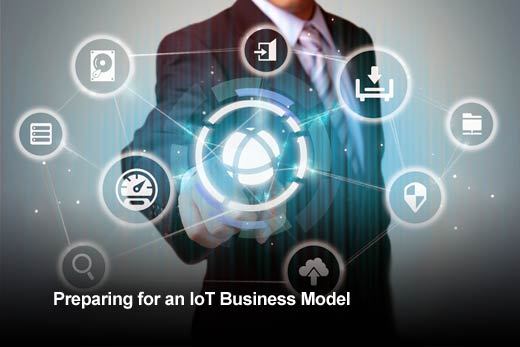There is a lot of hype around the Internet of Things (IoT), but make no mistake, the IoT is here to stay and will have a transformative effect on businesses of all kinds. According to a 2015 report from McKinsey, over the next decade the economic impact of the Internet of Things will be as much as $11.1 trillion per year. Ensuring that your IT processes and technologies are prepared for the changes the IoT will bring will be crucial. Investments in infrastructure, security solutions and analytic capabilities are musts for any organization.
Business models are changing too. With the rise of the service economy — a concerted effort by many businesses to focus on developing revenue from their existing customer base (e.g., subscription services, recurring billing, professional services and product/service bundling) — companies are shifting from being product-oriented to service-oriented. Although IoT-inspired business models have not hit the masses, many C-level executives are already evaluating how the IoT may change the way they deliver, measure usage, and ultimately bill for products/services. Sensors and wearables will soon be used to measure how much of a given product or service is used, and businesses will charge accordingly. Recurring revenue is increasingly becoming a key tenet of any business; however, first there needs to be a financial system to support it. When the IoT goes mainstream, will your business be able to perform?
In this slideshow, Kevin Roberts, director of platform technology at FinancialForce, outlines the five questions CFOs and CIOs need to ask themselves to better prepare their infrastructure to support an IoT-centric model.
Preparing for an IoT Business Model
Click through for five questions CFOs and CIOs need to ask themselves to better prepare their infrastructure to support an IoT-centric model, as identified by Kevin Roberts, director of platform technology at FinancialForce.
Customer Data Access
Do you have access to customer data?
The IoT is creating a shift within our business models where data is becoming the most valuable asset and customer expectations are increasing at a high rate. Companies need to have as many insights into customer satisfaction as possible and have the ability to leverage this data quickly and strategically. This requires breaking down the data silos among client, services, sales and finance.
No matter the department, all back-office applications must be organized around the customer and its data – so that processes can be smooth, visibility can be clear, and employees have the ability to make well-informed decisions from any part of the business. The closer you can get to a single source of truth for all your customer data, the better, especially as the IoT shines a spotlight on its importance.
Recurring Revenue Models
Are your financial systems geared toward supporting recurring revenue models?
According to a recent survey from the Institute of Management Accountants (IMA), spreadsheets are still the most commonly used method to track revenue recognition despite their inability to handle complex or large volumes of data.
CFOs and CIOs need to be aware of how accounting standards will change and find out what technological capabilities will be required to accommodate them. They must assess major technological shifts, adopt new accounting models, or risk losing market share for failing to give customers the new billing models that they want. In most cases, there will need to be an adoption of a financial system that can handle recurring revenue.
The solution to this problem is a mix of both technology implementation and meeting new accounting standards, and requires an effective partnership between the CFO and CIO.
Automation
How much of your financial technology process is automated?
Inputting transactions, handling account reconciliation and managing revenue are a few of the most time-consuming tasks for any finance department. As customer bases and data from the IoT both grow, it will be crucial to automate these processes as much as possible to ensure that the business can scale with its growth effectively.
Your financial processes need to be automated so they can quickly and accurately handle any new business requirements that come your way. The faster you can close books, the more time and money your organization will save; you will also be able to provide financial insights faster to management, auditors and investors.
Reporting
How much of your data is reported in real time vs. after the fact?
It’s safe to say that almost every industry has been affected by the 24-hour, real-time nature of the Internet. With the upcoming onslaught of data generated from the IoT, the pace of business will increase even more and customers will further demand instant, timely information. Real-time reporting will soon be a must, not a nice-to-have. Departments need to understand what is going on across business operations and customer reactions in real time, not after the fact.
Beyond that, finance departments should train their employees to build effective visual reports, interpret analytics, and write compelling narratives that are easy to understand for the non-finance layperson. The goal of a finance department is not just to keep track of cash flow, but also empower the business to strategically get ahead of the competition.
Collaboration
Is your back office collaborating with your front office?
A financial system should be equipped with tools that provide organizations with agile communication between the front-end and back-end of a workplace. Finance may be focused on getting invoices paid, but often lacks context of the customer relationship. If sales is finalizing a new upsell, finance may jeopardize a big deal by chasing a smaller cost.
Having cross-departmental collaboration features built in to your system of record and molded around functional needs and work patterns is a must for any organization that wants to stay competitive today and in tomorrow’s IoT economy. CFOs need to work with CIOs to ensure that this sort of system is implemented and tailored to an organization’s business processes and strategic needs.








